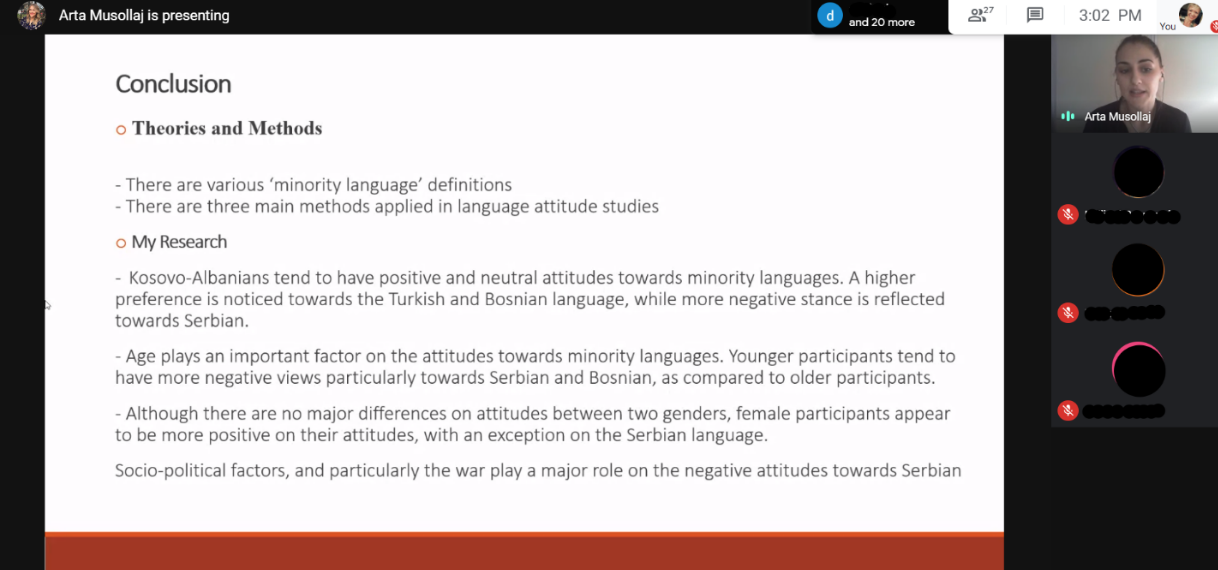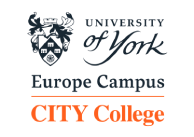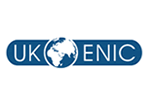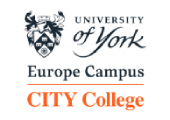The English Studies Department Ponders Attitudes towards Minority Languages

An academic environment is not simply about the courses and programs, skills and seminars. It is also concerned with consulting and, better yet, conducting research. CITY College, and all its Departments, pride themselves on research-led teaching/learning as well as conducting quantitative and qualitative research. For the 3rd Personal and Professional Development Seminar, delivered today, Tuesday, 24th November 2020, the English Studies Department invited PhD candidate of The University of Sheffield, School of English, Ms Arta Mussolaj, to share both her PhD topic and research experience with fellow and soon-to-be researchers. The title of her seminar: The way you see my language: Conducting research on attitudes towards minority languages, demonstrates yet another topical and highly significant thematic area of research with implications across an array of disciplines
Ms Mussolaj, primarily provides the definitions pertaining to minority languages as well as how attitudes towards languages (and potential speakers) are defined and understood via available literature. Upon delineating the topical area, Ms Mussolaj, presents the different types of research methods one can adopt in order to examine and research said topical areas, namely Direct, Indirect and Societal treatment approaches. The advantages and disadvantages are presented and Ms Mussolaj is clear in pointing out that the methodology highly depends on what best fits the aims of the research.
Following this, Ms Mussolaj, provides an overview of the context of the country in which her research took place, that of Kosovo. With the assistance of visual aids, maps, and graphs, Ms Mussolaj demonstrates the various factors related to the context that had to be taken into account, ranging from the linguistic plurality, to the language policies, and community demographics. In addition, other aspects also had to be considered, such as the nature of the research and the methodology that she would ultimately adopt. In Ms Mussolaj’s case, her PhD dissertation adopts the Direct method (questionnaires and interviews).
Upon formulating her Research Questions and Hypotheses, another vital aspect is the matter of participants and factors to consider in relation to them such as: age range, gender, the sample size and certain parameters that may create challenges such as how to recruit participants, or how the geographical factors play a role in the representativeness of the sample. Of course, in addition to the adhering to the ethical processes necessary to conduct such research, another challenging item was that of the questionnaire. Ms Mussolaj actually informs that a pilot questionnaire with a much smaller sample size assisted her in identifying potential oversights and problems that she could then amend before proceeding with the actual data collection.
Regarding the data collection in itself, this turned out to be quite a massive sample, amounting to 1115 valid responses. What is more, Ms Mussolaj collected the data in person by visiting district areas in Kosovo and approaching potential participants in public spaces, participants who upon giving them consent (oral and in written form) enabled Ms Mussolaj to reach the statistical findings pertaining to attitudes towards minority languages in Kosovo, a quantitative study that as of yet, has not been conducted in this area.
Ms Mussolaj shared both the positive and rewarding aspects of this experience but also the challenges she faced along with back-up ideas and suggestions as to how to manage and tackle them. Her research is ultimately insightful, intriguing and a valuable contribution to the scientific and academic areas of research. The implications of her research can benefit many disciplines, many scholars and many students. Her willingness to share her research journey is not only telling and admirable but also a reminder of how important it is for us to help researchers and contribute towards such research that can be quite revealing about people, languages, societies and cultures.








